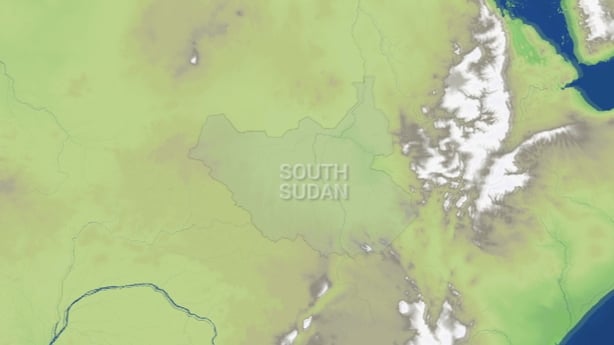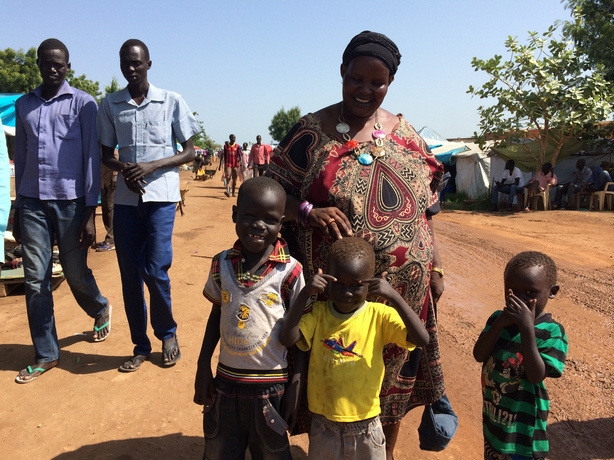Nyamoci, Nhiel and Koung. Those are the names of Rebecca's three missing children.
We met the mother of five at a water station in a camp for those who fled the violence of the civil war, in the UN compound in Juba, where she fled with her husband and her two other children on 16 December 2013, the day after the fighting began.
Since then UN Tom Ping has become her home, as it has for between 14,000 and 18,000 people, and like Rebecca the vast majority are Nuer, writes RTÉ's Laura Fletcher.
Its one of two UN compounds that have been turned into camps for those who have been made refugees in their own country.

Conditions here are harsh and there are efforts to move the people who are living here to another 'Protection of Civilian' camp, at the second UN compound across town.
But many, including Rebecca, are unwilling to go. Difficult as it is here, it has become familiar.
She doesn't know if her missing children are alive or dead, and Rebecca described being without them like a having a weight on her heart.
According to UNICEF, between 3,500 and 4,000 children have been torn from their families in the chaos and violence of the civil war in South Sudan.
They have managed to re-unify some with their families. Rebecca has not given up hope.
Approaching its third birthday on 9 July, South Sudan is the world's newest country.

For the South Sudanese war is all too familiar. South Sudan fought in two civil wars against the government of Sudan between 1955-1972 and 1983-2005 to secure its independence at a cost of 2.5 million lives.
This conflict is different. It is a war born out of a dispute between men who fought together during those wars for this new nation’s independence.
On 15 December last, fighting broke out within the ranks of the Presidential Guard, between men loyal to President Salva Kiir, who is Dinka, and those loyal to former Vice President Riek Machar, who is Nuer.
The fighting spread to other towns and cities, Dinka and Nuer soldiers pitted against one another.
It also spilled into civilian areas, with both sides committing atrocities against civilians, Dinka against Nuer and Nuer against Dinka.
This may have become a war fought along ethnic lines, but this is perhaps an over-simplistic view.
Edmund Yakani is the Executive Director of the Community Empowerment for Progress Organisation (CEPO).
Set up seven years ago, CEPO works within local communities and political circles, with “democratic transformation, peace building and sustainable government” the organisation’s buzz words.
"I would say the trigger factor is too much politicising and militarising ethnicity, [that] has brought the ethnic dimension, but actually it is a power struggle between the two leaders, between our President Salva Kiir and the leader of the opposition De Riek Machar," he told us.
His view is echoed by Dr Julia Duany, the Vice Chancellor of the John Garang Memorial University of Science and Technology in Bor.
Her father was Dinka and her mother Nuer and Dr Duany emigrated to the US to escape the civil wars within Sudan and only returned when the Comprehensive Peace Agreement was signed in 2005.
"It was so exciting, for some of us who grew up in the war and here was independence and this is what the South Sudanese had been fighting for since 1947.
"When it became true everyone was rejoicing... now look at us, look at what we have done to ourselves."
Fighting has died down, but it has not stopped. There are ongoing battles over the towns of Bentiu, Nasir and Renk.
And even in Juba, Dr Duany, who identifies herself as a Nuer, says soldiers still knock on her door
At least 10,000 people have been killed in the conflict and 1.5 million people are displaced as a result.
94,000 are in UN camps like Rebecca, almost 400,000 have crossed into other countries, and the rest are seeking shelter where they can, in sympathetic communities where resources are increasingly stretched, or by rivers, in fields and in the bush.
The result is a humanitarian crisis.
There was a ceasefire agreed in January, but it meant little.

The same was true of that agreed in May. Earlier this month Kiir and Machar agreed to talks on a transitional government with an end date set for 10 August.
The latest attempt to make progress in the Ethiopian Capital Addis Ababa, where negotiations have been taking place, stalled.
They have been postponed until further notice.
There are over 60 different ethnic groups in South Sudan, and more than 80 linguistic ones.
The conflict that has become an ethnic war between Dinka and Nuer is affecting the whole population.
South Sudan needs its leaders to find some solution, but there is a scepticsism here that these leaders are truly willing to try to find one by 10 August, or at all.
Watch Laura's report from South Sudan here.

